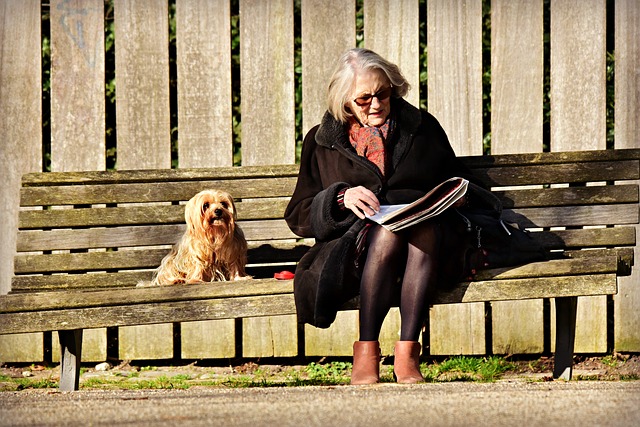That depends…
Most own a dog for companionship. But can they care for a dog—both physically and financially? Will a dog hurt them by tripping them or knocking them over? Do they have a Plan B for someone to care for the dog if they get sick or injured?
Each of my relatives below shows the pros and cons of seniors owning a dog.
- I have an 83-year old aunt who recently got a
new dog after her old dog died. A friend gave her a 5-year-old Chihuahua mix.
She lives in a condominium and takes her dog for short walks. She uses a cane
and has very poor eyesight. Mitsy gives my aunt good companionship since she
rarely leaves her home and her doctor says its good exercise for her to walk
her dog. - My uncle is 75 and in poor health, as is his
wife. They live in a home, but will have to move soon due to financial
problems. Their husky mix provides companionship, but my uncle does not walk
his dog. The dog would likely pull and make him fall. Their dog sheds a lot and
they have difficulty cleaning up after him. - My 85-year old mom owned two cocker spaniels.
She had a fenced in yard and the financial capacity to take them to the vet and
groomer. However, since she lived alone, someone (me) had to take care of her
dogs when she broke her hip and needed rehabilitation.
A recent
study states that dog walking can be hazardous for seniors since there is a risk of falling. I have fallen many times when walking my dogs, usually due to slipping on ice, but sometimes from a leash wrapping around my legs. For a senior citizen, falling and breaking a bone can be life changing—it was for both my mom and one of my aunts. They both ended up in rehab and their borderline dementia became accelerated to the point where they could no longer live alone.
Senior dogs for senior citizens are a good idea, but one really has to consider each individual’s circumstances.

Pet ownership for seniors provides many benefits:
- companionship
- sense of security
- a reason to get up in the morning
- provide exercise
- entertaining
But there are also many cons to owning a dog when you are up there in years.
- A dog could make you fall by causing you to
trip, or by pulling you off balance. Dog-walking fractures increased from 1,671
in 2004 to 4,396 in 2017 – possibly due to more seniors owning dogs and taking
them for walks as reported in this recent
article in the Washington Post. - Can you afford a dog? Pets cost a lot, even with
the availability of low cost clinics. It is not just food; other costs include vaccinations,
miscellaneous vet visits, and groomers (depending on your pet’s needs). - Will you be moving in the near future and can
your new home (a retirement center, a relative, an apartment, etc.) allow you
to own a pet. - Do you plan to travel a lot? Who will care for
your dog? - Can you give your dog the exercise it needs? The
training? Someone in their 80s may not do well with a puppy, especially one
that needs a lot of exercise. Small dogs may be better as we age since they can
exercise inside the house and may not need much walking. - Do you have a backup plan if you cannot walk or
exercise your dog for a period, such as a dog walker, a fenced yard, or piddle
pads?
Owning a pet is a big decision. I always figure that I am going to keep the dog for about twelve years, so plan ahead.
My rule of thumb is to not own a dog that I cannot pick up—at some point I’ve had to carry every dog I have ever owned. I already have a plan as I age. Buffy, my 10-year-old cocker may still have a few years left, but then I plan to get a springer spaniel that will encourage me to take long walks in the forest preserve (something Buffy does not like to do). By the time the springer gets old, I will be in my mid-seventies and then I’ll get another cocker since they are about twenty pounds lighter than springers and need less exercise.
Do you know any seniors where the dog they own does not match their circumstances?



I come from the cat side of things and as long as you can scoop the litter box and afford the feed it and vet it I think it is a great idea – especially matching a middle aged kitty to a senior. It’s great for both human and kitty. Just not a person who will see a cat as a poor substitute for a dog.
It is so important to always do your research, understand the pros and cons and choose the right dog for your lifestyle. I think small dogs can be great for seniors in so many ways and worth the risks if they can afford one and find the right one. That said, I slipped on ice taking Kilo out 10 days ago and I think my ankle is probably fractured – off to check tomorrow.
Wow ! What an interesting post and something every dog owner should think about young or old. You bring up some very valid points about mobility and falling on walks. However I have heard of much younger folks injuring themselves walking their dogs too. I’d have to agree though…every situation is different. I guess it just depends on the overall environment, health and resource the senior is in and has access to to make sure both parties have quality of life.
This topic has been on my mind a lot lately! While we have younger dogs, I was thinking down the road if I would get another one after these two. I love the companionship and the giving and receiving of love – but puppy-hood can be a pain. We’ve adopted seniors before and have just loved them – so sweet, mellow, trained, and grateful. So we’ll probably go that route. Also, have to include them in our will – just in case anything ever happens! Great post!
That is indeed a big question. Even myself, we’re considering moving to a smaller breed for our next dog, as well as an older one as we are aging.
You make great points here Sandy. Like anyone else, the dog and pet parent must be the right fit. I have a Husky so when you mentioned your elderly relative w/ a Husky mix I kind of gasped a little. The are super energetic and of course they love to pull! Anyone can get a debilitating illness or injury, no matter what your age. Another big consideration is whether or not a person has the funds to hire a dog walker or other helper and care for the pet’s health as the pet ages. I find activity level needs and financial considerations to be the most important factors.
Love & Biscuits,
Dogs Luv Us and We Luv Them
I fully believe everyone should be able to have a pet it does not matter what age. The only thing I do point out that the older you are it should be a small dog that one can handle. My Mom is 92 and her dog passed away last year, she has decided not to get another one but her boyfriend goes to the shelter on a daily basis to get his dose of dogs by walking them there and I think that is amazing
Loved this article!! I do know seniors who should not have the dog they have. I volunteer for an organisation that helps older people care for their animals, usually by walking them. I was helping such a lovely couple recently, really nice people but they have a young chocolate lab. The dog is fat, untrained and very powerful. It’s hard for me to walk her, and they certainly can’t. They rely on a paid dog walker in the morning, I walk her Sat and Sun afternoon and other woman walks her Thurs and Fri afternoon. Sadly the dog doesn’t get out nearly as much as she should and she’s so sweet. The man was taken to the hospital recently, his wife has Parkinson’s so is in a care home for the moment and the dog is staying with a neighbour. He did tell me when they couldn’t take care of the dog any longer there is someone who would take her. That should have happened years ago. What really annoys me is how they ever thought they could handle the dog they chose. It’s along the lines of when I used to volunteer with the old dogs in a shelter, and elderly people would come by and say they wanted a young dog. They could barely walk themselves! At the end of the day and no matter the age, everyone should give a lot more thought to what they can and cannot handle. Sorry for the rant, it’s a sensitive subject.